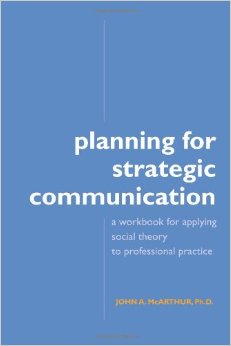For years, the objective on my resume and/or attached cover letter included the following phrase: “to communicate to a wide variety of audiences in a format they can relate to and understand.” At the time I was mainly thinking about journalistic writing styles for public audiences of varying backgrounds and media outlets. I still have the ability to communicate to a wide range of audiences, but my Master’s in Communication has allowed me to expand that audience to include communications professionals, executives in need of strategic plans, and academia.
Joining the Citation Nation of APA
 Academic writing was the most difficult concept for me to embrace. My creative writing background continually pushed me to not interrupt sentence flow with citations, while my journalistic background of AP writing butted against the APA style of academic writing (insert Oxford comma drama here). The resulting journey was one of learning tedious rules that were sometimes inconsistent and often difficult to track. Admittedly, I only used my APA style book for a few weeks before the Purdue Online Writing Lab (OWL) became my primary source for learning APA. In rare cases where the APA stylebook and OWL would fall short on emerging electronic resources like Tweets, YouTube comments and Ted Talks, the American Psychological Association Style Blog was always able to fill in the gaps.
Academic writing was the most difficult concept for me to embrace. My creative writing background continually pushed me to not interrupt sentence flow with citations, while my journalistic background of AP writing butted against the APA style of academic writing (insert Oxford comma drama here). The resulting journey was one of learning tedious rules that were sometimes inconsistent and often difficult to track. Admittedly, I only used my APA style book for a few weeks before the Purdue Online Writing Lab (OWL) became my primary source for learning APA. In rare cases where the APA stylebook and OWL would fall short on emerging electronic resources like Tweets, YouTube comments and Ted Talks, the American Psychological Association Style Blog was always able to fill in the gaps.
Writing that includes citations or strategies is not typically sought out by general audiences, but it is imperative to professionals who wish to apply real-world needs and questions to proven methods and research. I now have a renewed appreciation for academic writing with a higher regard for consistency of style. Citations are no longer seen as a parenthetical speed bump, but as an actual opportunity to track down more authors and the references that inspired them. Think of it as a Pandora music app for academic writing. You can go through a series of four or five papers that don’t really provide the information you need, but it’s very likely that one—or all—of those papers will be able to point you toward research that’s more applicable to your situation.
Developing a Strategic Plan
 Working within government settings and other professional environments has caused me to request or use strategic plans on numerous occasions. These plans often include big picture ideas that are based on research and common goals across multiple stakeholders and community groups, but rarely do they follow through with an extensive communication plan that supports that strategy. I had always assumed that each plan’s structure was complete and took for granted that it may need to be re-examined to include a communication component.
Working within government settings and other professional environments has caused me to request or use strategic plans on numerous occasions. These plans often include big picture ideas that are based on research and common goals across multiple stakeholders and community groups, but rarely do they follow through with an extensive communication plan that supports that strategy. I had always assumed that each plan’s structure was complete and took for granted that it may need to be re-examined to include a communication component.
The class Constructing Messages & Audiences (COMM 613G) with Dr. John McArthur at Queens University of Charlotte helped me understand the importance of having a strategic communication plan that I would want to read as a consumer. This drove me to focus on a plan that was applicable to my place of employment. While developing the plan, I created an approach that incorporated Putnam’s theory of social capital without being overly academic and exclusionary of my target audience. This plan also taught me how to create a plan that has style and is visually appealing. This can range anywhere from color schemes and font choices to appropriate headers and bulleted lists that keep the reader oriented with bite-sized information.
Looking Ahead
Creating work in so many styles and audiences has awakened new interests for me. I grew as a journalist and writer in the years leading up to the MA program, but my skillset was still quite limited to images and text. Now, I feel prepared to reframe those content creation skills in a way that gives me the confidence and skills needed to suggest the appropriate communication approach for the specific audience being targeted.
Example Projects
- Creative Connections_Using Digital Relationships to Start a Childrens Museum in New Bern NC
- Alone in a Crowd_High Noon and Coping with Death
- Style Guide Podcast
